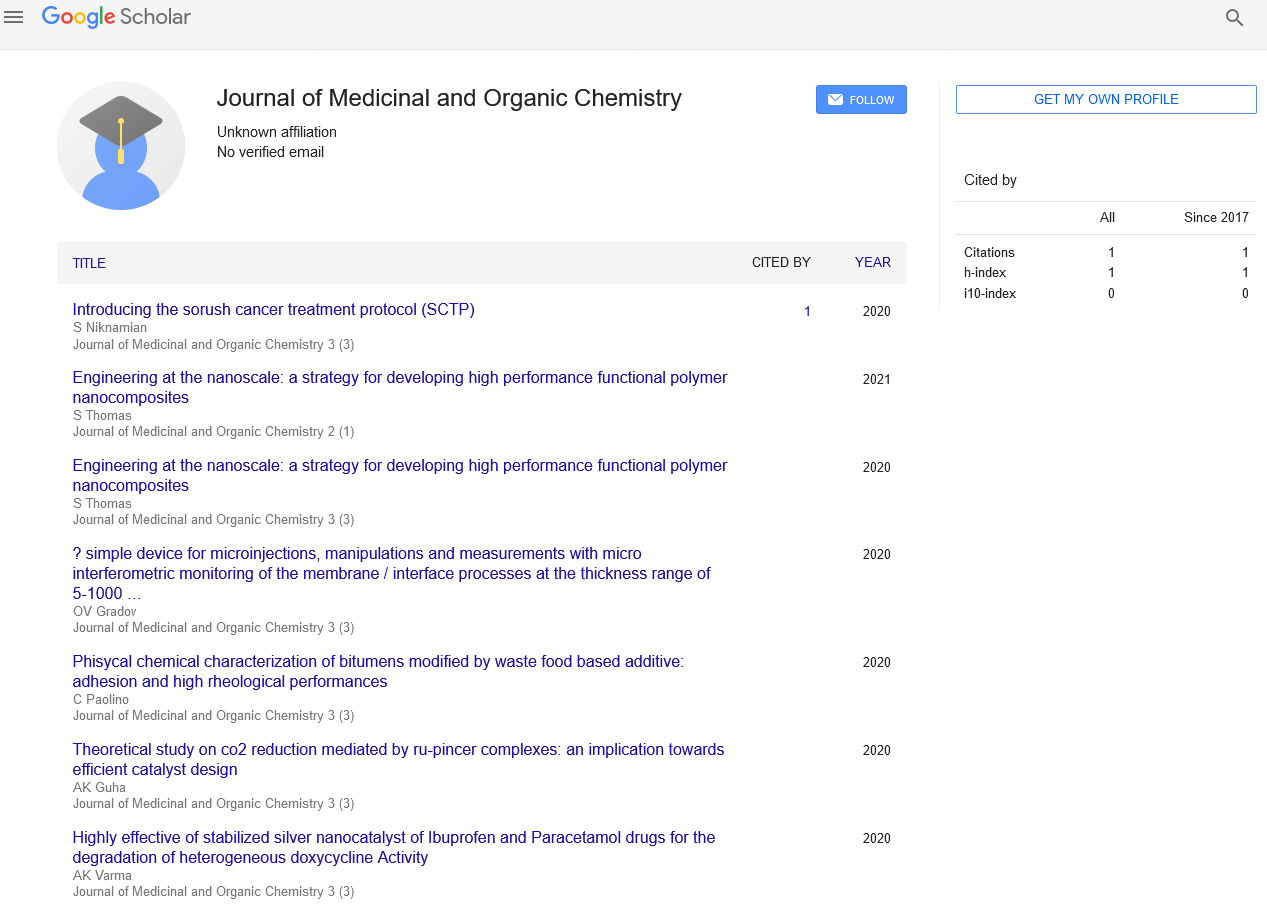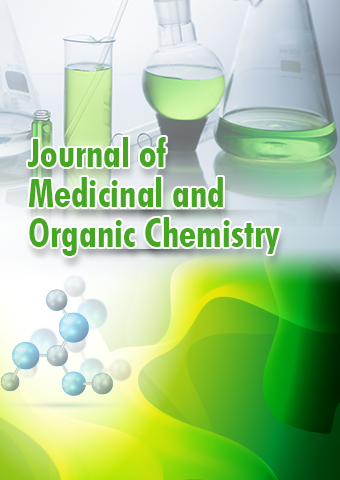Mini Review - Journal of Medicinal and Organic Chemistry (2023) Volume 6, Issue 2
Immunology Immune system: In Medicinal and Organic Chemistry
Dr. Deepak Shrma*
Department of Immunology and Organic Chemistry, University of SGS Science and Technology, India
Department of Immunology and Organic Chemistry, University of SGS Science and Technology, India
E-mail: shrma.d@gmail.com
Received: 31-Mar-2023, Manuscript No. jmoc-23-96914; Editor assigned: 03-April-2023, PreQC No. jmoc-23- 96914; Reviewed: 17-April-2023, QC No jmoc-23-96914; Revised: 21-April-2023, Manuscript No. jmoc-23-96914 (R); Published: 28-April-2023; DOI: 10.37532/ jmoc.2023.6(2).40-42
Abstract
Immunology is a field of study that is concerned with the understanding of the body’s immune system and how it functions to protect the body from diseases. In medicinal and organic chemistry, the understanding of immunology is critical to the development of drugs and therapies that can be used to treat various diseases.
One key area of research in immunology is the development of immunomodulatory drugs. These drugs are designed to modulate the immune system to either enhance or suppress its activity. This approach has been used successfully in the treatment of autoimmune diseases such as rheumatoid arthritis and multiple sclerosis, as well as in cancer therapy. Organic chemistry plays a crucial role in the development of immunomodulatory drugs by enabling the synthesis of new compounds with specific properties. For example, medicinal chemists can design small molecules that selectively target specific immune cells or molecular targets, leading to the development of more effective and safer drugs. Immunology is the branch of science that deals with the study of the immune system and its functions. It encompasses the interactions between various cells, molecules, and tissues that make up the immune system, and how they work together to protect the body from foreign invaders. Understanding immunology is critical for the development of effective treatments for diseases that affect the immune system, such as autoimmune disorders and cancer.
The immune system is a complex network of cells and tissues that work together to identify and eliminate pathogens, such as bacteria, viruses, and parasites, as well as abnormal cells, such as cancer cells. The immune system is composed of two main types of cells: innate immune cells and adaptive immune cells. Innate immune cells are the first line of defense against pathogens and include cells such as macrophages, neutrophils, and natural killer cells. Adaptive immune cells, on the other hand, are able to recognize and respond to specific pathogens and abnormal cells, and include cells such as T cells and B cells.
Keywords
Immune cells • T cells and B cells • Natural killer cells • Macrophages • Bacteria • Viruses, Pathogens • Cancer therapy • Target specific immune cells • Immune system • Medicinal and organic chemistry • Autoimmune diseases • Rheumatoid arthritis and multiple sclerosis
Introduction
The immune system is regulated by a complex network of signalling molecules and pathways, which allow it to respond appropriately to different types of threats. For example, when a pathogen enters the body, it triggers a cascade of events that lead to the activation of innate immune cells [1], which in turn stimulate the activation of adaptive immune cells [2]. This process involves the recognition of specific molecules on the surface of the pathogen by receptors on the surface of immune cells, which then trigger signalling pathways that lead to the activation of the immune response. Medicinal and organic chemistry play a critical role in the development of immunomodulatory drugs, which are designed to manipulate the immune system to treat diseases such as cancer, autoimmune disorders, and infectious diseases [3]. These drugs work by targeting specific molecules and pathways involved in the immune response, either by enhancing or suppressing their activity. One example of an immunomodulatory drug is checkpoint inhibitors, which are used to treat cancer [4]. Checkpoint inhibitors target specific molecules on T cells that act as brakes on the immune response, preventing the immune system from attacking cancer cells. By blocking these checkpoints, checkpoint inhibitors allow the immune system to recognize and attack cancer cells more effectively. Another example of an immunomodulatory drug is immunosuppressant, which are used to treat autoimmune disorders [5]. Immunosuppressant work by suppressing the activity of the immune system, thereby reducing the inflammation and tissue damage associated with autoimmune disorders. However, immunosuppressant can also increase the risk of infections, as they suppress the immune system’s ability to fight off pathogens [6]. Organic chemistry also plays a critical role in the development of immunomodulatory drugs, as it allows for the synthesis of small molecules that can selectively target specific molecules and pathways involved in the immune response [7]. For example, small molecule inhibitors of cytokine signalling pathways have been developed for the treatment of autoimmune disorders, such as rheumatoid arthritis [8]. These drugs work by blocking the activity of specific cytokines, which are signalling molecules involved in the immune response.
In addition to developing immunomodulatory drugs, medicinal and organic chemistry also play a critical role in the development of vaccines [9], which stimulate the immune system to recognize and respond to specific pathogens. Vaccines are typically composed of antigens, which are molecules from the pathogen that the immune system recognizes as foreign, as well as adjuvants, which are molecules that enhance the immune response to the antigen [10].
Conclusion
Immunology plays a crucial role in medicinal and organic chemistry, as it involves the study of the immune system’s response to various substances, including drugs and organic compounds. Understanding how the immune system reacts to these substances is essential for developing new drugs and therapies that can effectively treat diseases and disorders. In addition, the study of immunology has helped researchers identify new targets for drug development and has provided insight into the mechanisms of immunemediated diseases. This knowledge has led to the development of new therapies that target specific components of the immune system, such as cytokines, antibodies, and T cells, resulting in more effective and safer treatments for patients.
Overall, immunology has contributed significantly to the field of medicinal and organic chemistry and continues to play a critical role in the development of new drugs and therapies for various diseases and conditions. Its importance is likely to grow in the future, as researchers continue to explore the complex interactions between the immune system and various substances. Immunology is a critical field of study for the development of effective treatments for diseases that affect the immune system. Medicinal and organic chemistry play a critical role in the development of immunomodulatory drugs and vaccines, which are designed to manipulate the immune system to treat diseases such as cancer, autoimmune disorders, and infectious diseases. By understanding the complex interactions between cells, molecules, In addition to immunomodulatory drugs, immunology also plays a role in the development of vaccines. Vaccines work by stimulating the body’s immune system to recognize and attack a specific pathogen. Organic chemistry is used to synthesize the components of the vaccine, such as antigens and adjuvants, which are critical for inducing a robust immune response.
The understanding of immunology in medicinal and organic chemistry has led to the development of numerous drugs and therapies that have revolutionized the treatment of many diseases. As our understanding of the immune system continues to grow, it is likely that immunology will continue to play a critical role in the development of new drugs and therapies.
References
- Rajkumar R, Anandakumar K, Bharathi A et al. Coronary artery disease (CAD) prediction and classification-a survey. Breast Cancer. 90, 945-955 (2006).
- Lee G, Hwang J.A Novel Index to Detect Vegetation in Urban Areas Using UAV-Based Multispectral. Images Appl Sci. 11, 3472 (2021).
- Zou X, Mõttus M. Sensitivity of Common Vegetation Indices to the Canopy Structure of Field Crops. RSE. 9, 994 (2017).
- Vukasinovic.Real Life impact of anesthesia strategy for mechanical thrombectomy on the delay, recanalization and outcome in acute ischemic stroke patients. J Neuroradiol. 95, 391-392 (2019).
- Headey D. Developmental drivers of nutrional change: a cross-country analysis. World Dev. 42, 76-88 (2013).
- Deaton A, Dreze J. Food and nutrition in India: facts and interpretations. Econ Polit Wkly. 42– 65 (2008).
- Headey DD, Chiu A, Kadiyala S. Agriculture's role in the Indian enigma: help or hindrance to the crisis of undernutrition? Food security. 4, 87-102 (2012).
- Jackson Peter. The multiple ontologies of freshness in the UK and Portuguese agri‐food sectors. Trans Inst Br Geogr. 44, 79-93 (2019).
- Tetila EC, Machado BB. Detection and classification of soybean pests using deep learning with UAV images. Comput Electron Agric. 179, 105836 (2020).
- Kamilaris A, Prenafeata-Boldú F. Deep learning in agriculture: A survey.Comput Electron Agric.147, 70-90 (2018).
Indexed at, Google Scholar, Crossref
Indexed at, Google Scholar, Crossref

